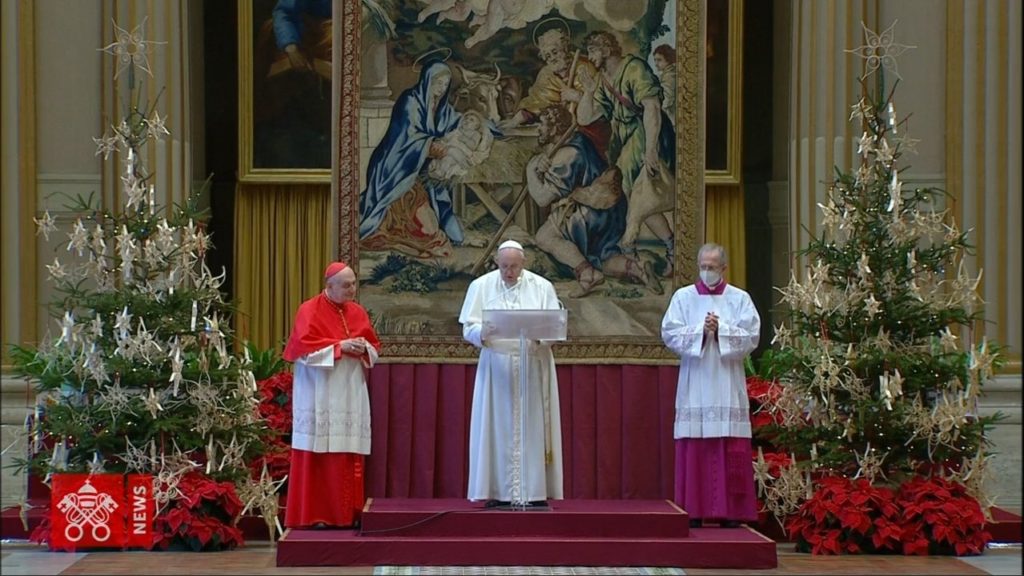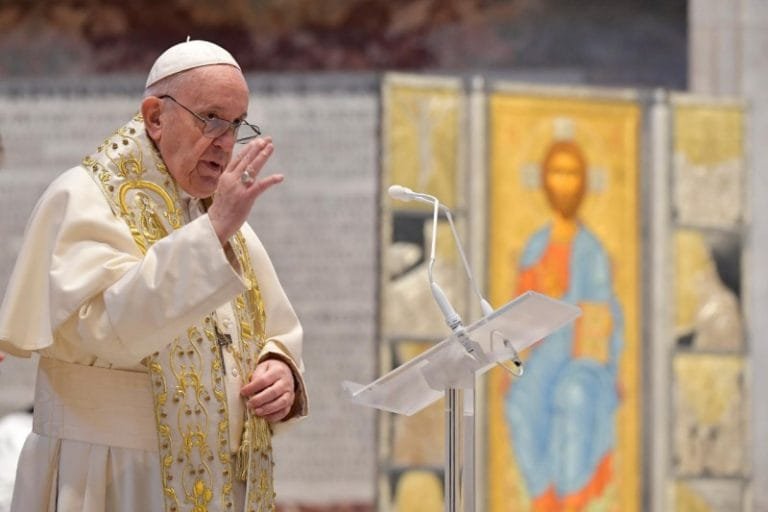
WATCH THE VIDEO OF 2020 CHRISTMAS URBI ET ORBI MESSAGE AND BLESSING
POPE FRANCIS CHRISTMAS 2020 “URBI ET ORBI” MESSAGE
5 December 2020
Dear Brothers and Sisters,
Merry Christmas!
I would like to bring to everyone the message that the Church proclaims on this feast with the words of the prophet Isaiah: “To us a child is born, to us a son is given” (Is 9:6)
A child is born. A birth is always a source of hope; it is life that blossoms, a promise of the future. Moreover, this Child, Jesus, was born “to us”: an “us” without any borders, privileges or exclusions. The Child born of the Virgin Mary in Bethlehem was born for everyone: he is the “son” that God has given to the entire human family.
Thanks to this Child, all of us can speak to God and call him “Father”. Jesus is the only-begotten Son; no one but he knows the Father. Yet he came into the world for this very reason: to show us the face of the Father. Thanks to this Child, we can all call one another brothers and sisters, for so we truly are. We come from every continent, from every language and culture, with our own identities and differences, yet we are all brothers and sisters.
At this moment in history, marked by the ecological crisis and grave economic and social imbalances only worsened by the coronavirus pandemic, it is all the more important for us to acknowledge one another as brothers and sisters. God has made this fraternal unity possible, by giving us his Son Jesus. The fraternity he offers us has nothing to do with fine words, abstract ideals or vague sentiments. It is a fraternity grounded in genuine love, making it possible for me to encounter others different from myself, feeling compassion for their sufferings, drawing near to them and caring for them even though they do not belong to my family, my ethnic group or my religion. For all their differences, they are still my brothers and sisters. The same thing is true of relationships between peoples and nations: brothers and sisters all!
At Christmas we celebrate the light of Christ who comes into the world; he comes for everyone, not just for some. Today, in this time of darkness and uncertainty regarding the pandemic, various lights of hope appear, such as the discovery of vaccines. But for these lights to illuminate and bring hope to all, they need to be available to all. We cannot allow the various forms of nationalism closed in on themselves to prevent us from living as the truly human family that we are. Nor can we allow the virus of radical individualism to get the better of us and make us indifferent to the suffering of other brothers and sisters. I cannot place myself ahead of others, letting the law of the marketplace and patents take precedence over the law of love and the health of humanity. I ask everyone – government leaders, businesses, international organizations – to foster cooperation and not competition, and to seek a solution for everyone: vaccines for all, especially for the most vulnerable and needy of all regions of the planet. Before all others: the most vulnerable and needy!
May the Child of Bethlehem help us, then, to be generous, supportive and helpful, especially towards those who are vulnerable, the sick, those unemployed or experiencing hardship due to the economic effects of the pandemic, and women who have suffered domestic violence during these months of lockdown.
In the face of a challenge that knows no borders, we cannot erect walls. All of us are in the same boat. Every other person is my brother or my sister. In everyone, I see reflected the face of God, and in those who suffer, I see the Lord pleading for my help. I see him in the sick, the poor, the unemployed, the marginalized, the migrant and the refugee: brothers and sisters all!
On this day, when the word of God became a child, let us turn our gaze to the many, all too many, children worldwide, especially in Syria, Iraq and Yemen, who still pay the high price of war. May their faces touch the consciences of all men and women of good will, so that the causes of conflicts can be addressed and courageous efforts can be made to build a future of peace.
May this be a favourable time to ease tensions throughout the Middle East and in the Eastern Mediterranean.
May the Infant Jesus heal the wounds of the beloved Syrian people, who for a decade have been devastated by war and its consequences, now aggravated by the pandemic. May he bring comfort to the Iraqi people and to all those involved in the work of reconciliation, and particularly to the Yazidis, sorely tried by these last years of war. May he bring peace to Libya and enable the new phase of the negotiations in course to end all forms of hostility in the country.
May the Babe of Bethlehem grant the gift of fraternity to the land that witnessed his birth. May Israelis and Palestinians regain mutual trust and seek a just and lasting peace through a direct dialogue capable of ending violence and overcoming endemic grievances, and thus bear witness before the world to the beauty of fraternity.
May the star that shone brightly on Christmas night offer guidance and encouragement to the Lebanese people, so that, with the support of the international community, they may not lose hope amid the difficulties they currently face. May the Prince of Peace help the country’s leaders to lay aside partial interests and commit themselves with seriousness, honesty and transparency to enabling Lebanon to undertake a process of reform and to persevere in its vocation of freedom and peaceful coexistence.
May the Son of the Most High sustain the commitment of the international community and the countries involved to continue the ceasefire in Nagorno-Karabakh, as well as in the eastern regions of Ukraine, and to foster dialogue as the sole path to peace and reconciliation.
May the Divine Child alleviate the suffering of the peoples of Burkina Faso, Mali and Niger, affected by a grave humanitarian crisis caused by extremism and armed conflicts, but also by the pandemic and other natural disasters. May he end the violence in Ethiopia, where many people have been forced to flee because of the fighting; comfort the inhabitants of the Cabo Delgado region in northern Mozambique, victims of the violence of international terrorism; and encourage the leaders of South Sudan, Nigeria and Cameroon to pursue the path of fraternity and dialogue they have undertaken.
May the Eternal Word of the Father be a source of hope for the American continent, particularly affected by the coronavirus, which has intensified its many sufferings, frequently aggravated by the effects of corruption and drug trafficking. May he help to ease the recent social tensions in Chile and end the sufferings of the people of Venezuela.
May the King of Heaven protect all victims of natural disasters in Southeast Asia, especially in the Philippines and Vietnam, where numerous storms have caused flooding, with devastating repercussions on families in terms of loss of life, harm to the environment and consequences for local economies.
As I think of Asia, I cannot forget the Rohingya people: may Jesus, who was born poor among the poor, bring them hope amid their sufferings.
Dear brothers and sisters,
“To us a child is born” (Is 9:6). He came to save us! He tells us that pain and evil are not the final word. To become resigned to violence and injustice would be to reject the joy and hope of Christmas.
On this festive day, I think in a special way of all those who refuse to let themselves be overcome by adversity, but instead work to bring hope, comfort and help to those who suffer and those who are alone.
Jesus was born in a stable, but was embraced by the love of the Virgin Mary and Saint Joseph. By his birth in the flesh, the Son of God consecrated familial love. My thoughts at this moment turn to families: to those who cannot come together today and to those forced to remain at home. May Christmas be an opportunity for all of us to rediscover the family as a cradle of life and faith, a place of acceptance and love, dialogue, forgiveness, fraternal solidarity and shared joy, a source of peace for all humanity.
Merry Christmas to everyone!
© Copyright – Libreria Editrice Vaticana
SOURCE: http://www.vatican.va/content/francesco/en/messages/urbi/documents/papa-francesco_20201225_urbi-et-orbi-natale.html
EMPHASIS MINE.
Below you have the English translation of the Latin text granting plenary indulgence.
“His Holiness Pope N. grants a plenary indulgence in the form laid down by the Church to all the faithful present and to those who receive his blessing by radio, television and the new communications media, and those who unite themselves spiritually. Let us ask Almighty God to grant the Pope many years as leader of the Church and peace and unity to the Church throughout the world.”
ROMAN PONTIFF:
May the Holy Apostles Peter and Paul, in whose power and authority we trust, intercede for us before the Lord.
℟: Amen.
Through the prayers and merits of Blessed Mary ever Virgin, Saint Michael the Archangel, Saint John the Baptist, the holy apostles Peter and Paul, and all the saints, may Almighty God have mercy on you and forgive all your sins, and may Jesus Christ bring you to everlasting life.
℟: Amen.
HERE ALL KNEEL
May the almighty and merciful Lord grant you indulgence, absolution and the remission of all your sins, a season of true and fruitful penance, a well-disposed heart, amendment of life, the grace and comfort of the Holy Spirit and final perseverance in good works.
℟: Amen.
And may the blessing of Almighty God, the Father, and the Son, and the Holy Spirit, come down on you and remain with you forever.
℟: Amen.
+++
Urbi et Orbi translates into English as “to the City [of Rome] and to the world”.
The term dates back to Roman times and is used by the head of the Catholic Church at Easter and Christmas.
• To obtain this remission there are proper dispositions and certain conditions predetermined by the Church that must be met by the faithful. The remission is acquired through the intervention of the Church, who has the power to loose and bind granted through Jesus Christ.
An indulgence can either be PARTIAL or PLENARY (TOTAL).
• It is partial if it removes only part of the temporal punishment due to sin, or plenary if it removes all punishment.
To be able to gain an indulgence, ONE MUST HAVE THE INTENTION TO GAIN THEM, and PERFORM THE WORKS AT THE TIME AND IN THE MANNER PRESCRIBED.
1. the faithful must receive the sacrament of CONFESSION, either 20 days before or after the pious act is performed,
2. receive HOLY COMMUNION on that DAY
3. and recite PRAYERS FOR THE INTENTIONS OF THE HOLY FATHER (one Our Father and one Hail Mary is the minimum, but any other additional prayers may be added).
4. ALL ATTACHMENT TO SIN, EVEN VENIAL SIN, MUST BE ABSENT. If one’s disposition is less than perfect or if some of the above conditions are not fulfilled, the indulgence becomes partial.
IMPORTANT: “In the current context of the health emergency, the gift of the plenary indulgence is particularly extended to the elderly, the sick, those close to death and all those who for legitimate reasons find it impossible to leave their homes,” the decree states, suggesting such persons can obtain the indulgence by having an intention to fulfill the requirements “as soon as its possible.”
Apostolic Decree on the gift of special plenary indulgences on the Year of St. Joseph.
